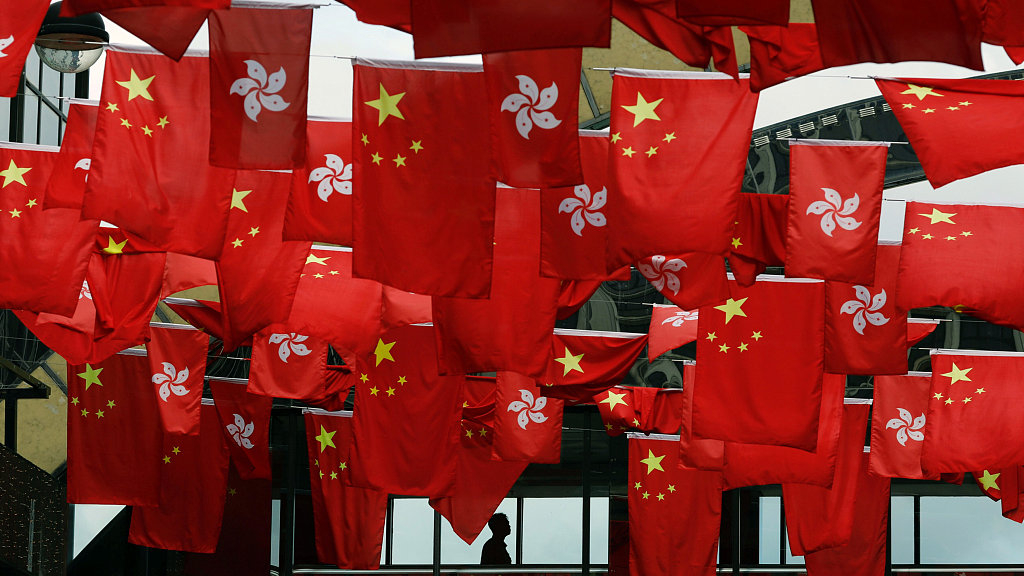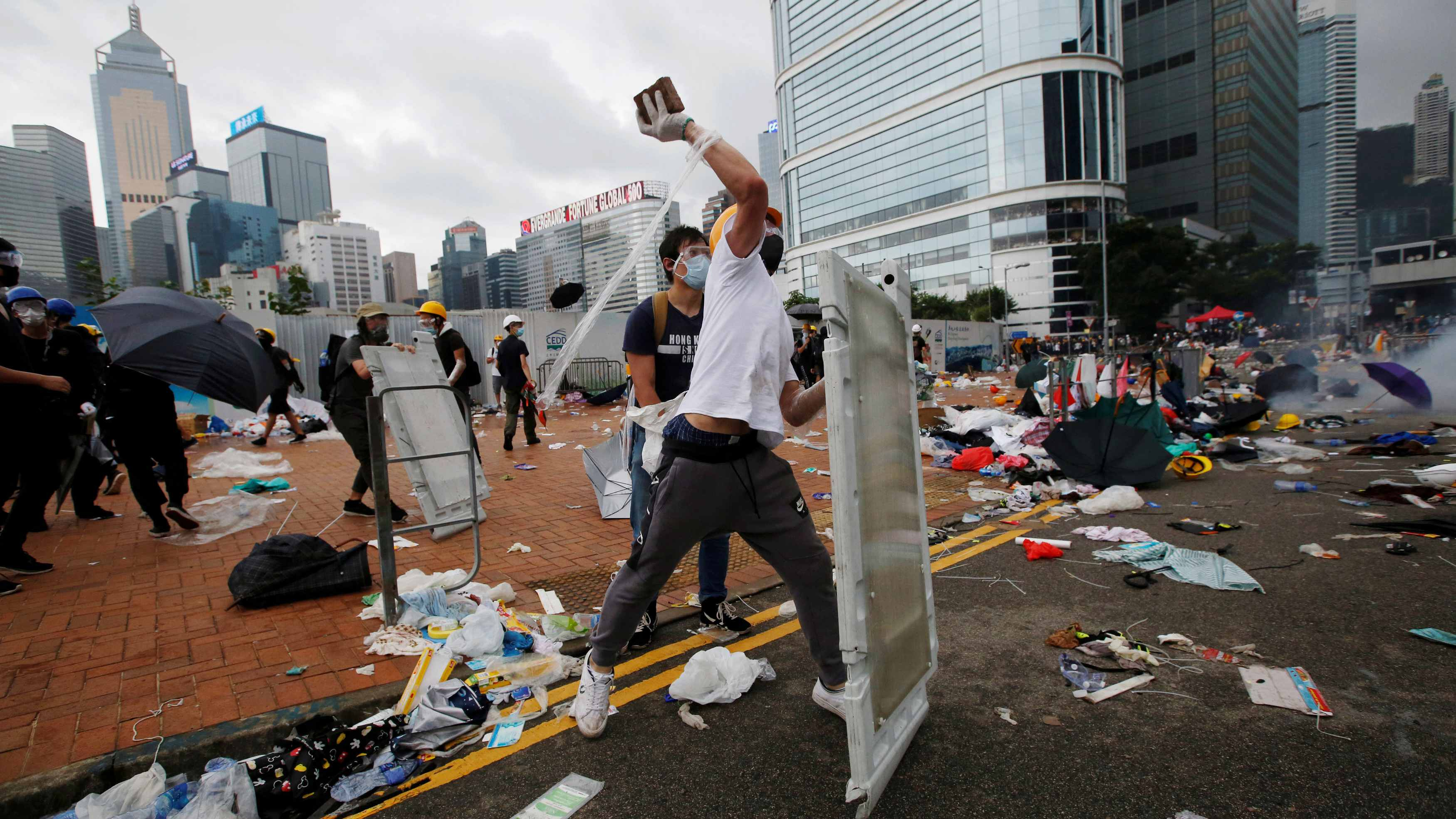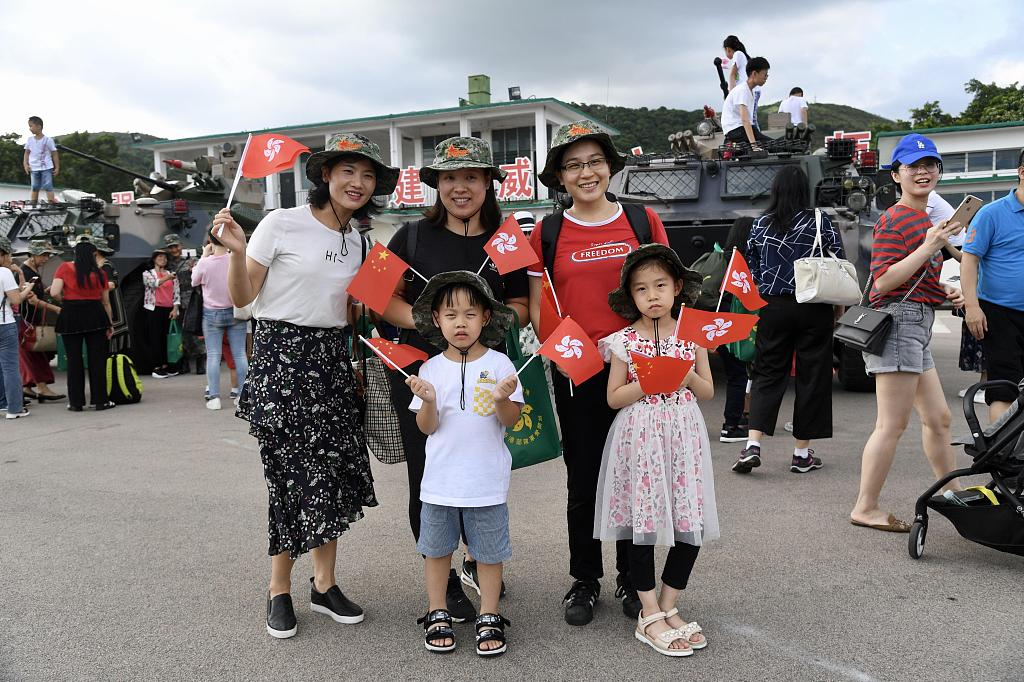

Editor's Note: Zhang Weiwei is a Chinese professor of international relations at Fudan University. This is an edited translation of an interview first published by China Central Television (CCTV)'s Wechat account on August 31. The article reflects the author's opinions, and not necessarily the views of CGTN.
The turbulent situation in Hong Kong – endless unlawful assemblies and violent protests – has gone on for more than two months. People are increasingly aware of the nature of the "color revolution" in the street violence and the thinly-veiled role played by the United States.
Recently, more than 100 Hong Kong people spontaneously marched in front of the U.S. Consulate General in Hong Kong, chanting the slogan of "Hong Kong Thugs, Made in America" to protest against the gross interference of the U.S. in China's internal affairs. How does Zhang look at the situation in Hong Kong?
CCTV: You said that Hong Kong had deep-seated challenges. Are you worried that Hong Kong will experience something similar to the "Arab Spring" in North Africa and Egypt?
Zhang: As early as 2014, the day when the "Occupy Central" movement broke in Hong Kong, I told a BBC reporter that that was a wrong movement that was staged at the wrong time and place, so the probability of failure is 100 percent.
I said we had been following the opinion polls in Hong Kong for a long time, and what the local people and the majority of young people were most concerned about were livelihood, employment, housing, among others.
The Western forces that are trying to start the so-called "color revolution" deliberately turn the anger of young people to the Hong Kong SAR government. However, once this movement was launched, it would damage Hong Kong's economy.
From what we see now, the occupancy rate of hotels in Hong Kong has been reduced by 50 percent, and taxi drivers may have suffered losses of more than 50 percent. The damage is worse than what caused by the 2008 financial crisis and is likely to linger for quite a long time.

A protester throws a brick during a demonstration against a proposed extradition bill, in Hong Kong, China, June 12, 2019. /Reuters Photo
So, that means the movement won't last. One of the main signs of the decline of the movement is that on August 16, Hong Kong people held a "National Withdrawal Day" – withdrawing their money from the banks and change it into U.S. dollars.
The total withdrawal in Hong Kong on that day was merely 2.81 million Hong Kong dollars (2.5 million yuan), which was not enough to buy even half of a parking space. That is to say, the majority of the local people do not support the movement.
U.S. direct intervention is to blame for the Hong Kong violence. China and the U.S. are currently mired in trade disputes. U.S. President Donald Trump mistakenly believed that he would easily win. The fact is that he is met with setbacks at every turn.
Our countermeasures are well targeted and forceful, and, as a result, the U.S. stock market fell sharply. This is what President Trump is most afraid of right now, as this will affect his bid for re-election in 2020. An American official once said that protests in Hong Kong are beneficial to the U.S., as this is another card the U.S. can play in the Sino-U.S. trade talks.
CCTV: Do you think Hong Kong is comparable to Egypt eight years ago?
Zhang: It's not comparable. President Trump may do whatever he likes about Hong Kong, but he will never succeed. There is a powerful People's Republic of China behind Hong Kong.
CCTV: In Hong Kong violence, some demonstrators waved the flags of the United States and the United Kingdom, and insulted China's national flag and national emblem. In your opinion, what is the mentality of these demonstrators?
Zhang: It is incomprehensible for educated people from the Chinese mainland. We call them traitors. In fact, there are quite a number of people like this in Hong Kong. They are Chinese in appearance, but they hold a British or Canadian passport and are anti-Communist and anti-China deep inside.
They believe that the West represents the best of everything, even though the United States and Britain are in a mess and their per capita GDP is lower than that of Hong Kong. Still, these people worship Britain and the United States. It also shows that the Hong Kong movement has the financial support from Britain and the United States.

Residents visit the new barrack of People's Liberation Army Hong Kong Garrison in Hong Kong, June 19, 2018. /VCG Photo
The same thing happened when the "color revolution" broke out in Ukraine where people held the flags of the European Union, the United States and the United Kingdom. Behind them were the organizations funded by these countries.
The West controls the mainstream media. If there are different voices saying that these countries played a role behind the scenes, the media immediately denied it by insisting that the movement was spontaneous. This is typical of a "color revolution."
You can look at some basic facts. The number of personnel in the U.S. and British consulates general in Hong Kong exceeds that in their embassies in Beijing and their consulates general in Shanghai.
Part of it is left over from history. After more than 150 years of British colonial rule, many Britons have long lived and worked there, and their institutions have long been established. But later, they have been infiltrated by hostile forces.
We can see very clearly that throughout the process, Anson Chan, Jimmy Lai and others backing the Hong Kong movement have been in contact with consulates general of the United States and the United Kingdom. We also see that there are scheduled meetings between them and U.S. State Secretary Mike Pompeo and U.S. Vice President Mike Pence respectively.
CCTV: But U.S. President Donald Trump has said that Hong Kong is China's own business.
Zhang: There are two different forces in this. President Trump made it clear that this is China's internal affair. Let's leave it alone. Because he is concerned about another matter, the 2020 election. He is afraid that the Hong Kong stock market may affect the U.S. stock market, and a fall in the stock market will be bad for his vote.
But people like Nancy Pelosi and Mike Pompeo are not worried about votes.
CCTV: A spokesperson for the Hong Kong and Macao Affairs Office of the State Council of China said that radical demonstrators and protesters in Hong Kong have shown signs of terrorism. What do you think of this?
Zhang: You have seen such signs, such as the use of fire bombs, violence at the airport against people from the Chinese mainland, and illegal punishment, all of which are signs of terrorism. We point out this fact truthfully and hope that it will not go further. It is also a warning, which I think is really necessary.
(If you want to contribute and have specific expertise, please contact us at opinions@cgtn.com)

Copyright © 2018 CGTN. Beijing ICP prepared NO.16065310-3
Copyright © 2018 CGTN. Beijing ICP prepared NO.16065310-3